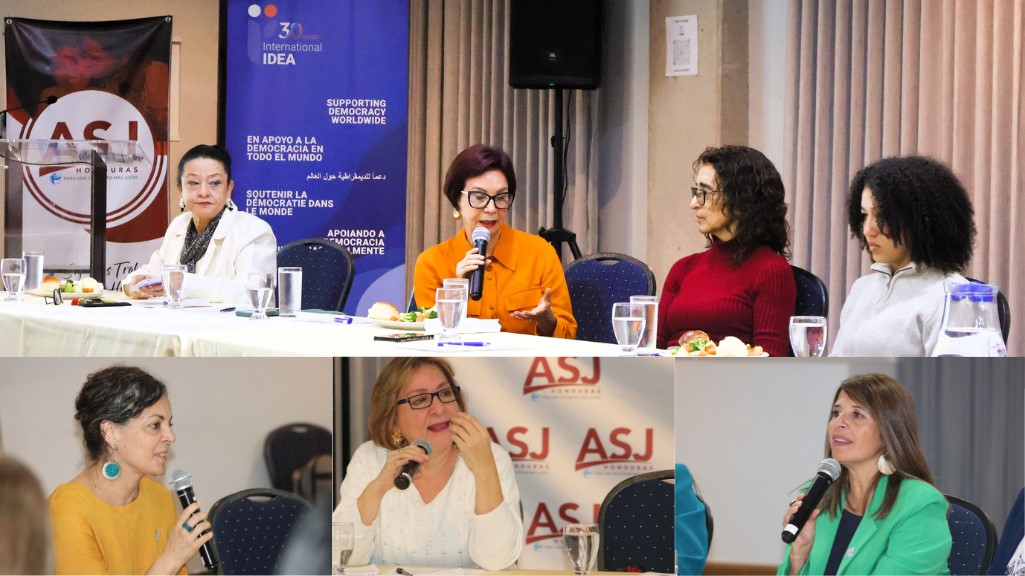En el marco del 40° aniversario del Programa Latinoamericano del Centro Woodrow Wilson, el Director Regional de IDEA Internacional para América Latina y el Caribe, Dr Daniel Zovatto, participó en la conferencia “Latin America's Domestic and International Challenges”, que convocó entre otras importantes personalidades al Expresidente de Brasil, F
Búsqueda
Region
Country
Type
On Tuesday, 10 October 2017, International IDEA hosted at its headquarters in Stockholm, an informal discussion with the Ambassador of the Kingdom of Morocco to Sweden, Amina Bouayach, to reflect on the process towards democratization that her country has made in recent years.
Is corruption always a constraint for development? Is there a universal means to tackle corruption? What impact does corruption have on the quality of democracy?
The International Institute for Electoral Assistance (International IDEA) has appointed Democracy Ambassadors ahead of the Global State of Democracy publication, to be launched in November 2017.
Disclaimer: Views expressed in this commentary are those of the staff member. This commentary is independent of specific national or political interests. Views expressed do not necessarily represent the institutional position of International IDEA, its Board of Advisers or its Council of Member States.
Disclaimer: Views expressed in this commentary are those of the staff member. This commentary is independent of specific national or political interests. Views expressed do not necessarily represent the institutional position of International IDEA, its Board of Advisers or its Council of Member States.
The number of women in politics and decision-making spaces has been increasing very slowly in Peru. In 2016, the country began a major electoral reform process that International IDEA has been supporting. The first reform proposal represents an important development as it includes parity and alternation in electoral lists. Continued efforts to embed and progress this debate within the Peruvian parliament are needed.
Yachts. Cars. Cash. Around 3.5 million euro held by former Tunisian President, Ben Ali, was returned to the country in May 2015 after Swiss authorities joined efforts with their Tunisian counterparts to seize his stolen assets.
On 4 October 2017, International IDEA and Belgian Technical Cooperation (BTC)* signed a Cooperation Framework Agreement for the Democratic Governance Sector at the BTC headquarters in Brussels.
In the first three months of this year, hundreds of thousands of Romanians took to the streets of Bucharest. They protested against political corruption and attempts by politicians to maintain immunity in the face of serious fraud allegations. After politicians ultimately backed off from their plans, the protests subsumed. What remained, however, was a society with pervasive political corruption, in need of new instruments to detect and prosecute corrupt politicians.
In the first week of September 2017, as two experts from UK Parliament/British Parliament, we were in Thimphu to assist in developing a Guideline for Review of Bill for the Parliament of Bhutan with support of International IDEA.
On 10 October 2017, the Government of Mexico, represented by the Ambassador of Mexico to Sweden, Agustín Gasca Pliego, joined International IDEA's Secretary-General Yves Leterme, and Regional Director for Latin America and the Caribbean, Daniel Zovatto, for the signing ceremony of the host-country agreement to establish a sub-regional office of International IDEA in Mexico City.
El 10 de octubre de 2017, el Gobierno de México, representado por el Embajador de México en Suecia, Agustín Gasca Pliego, se reunió junto al Secretario General de IDEA Internacional, Yves Leterme, y el Director Regional para América Latina y el Caribe, Daniel Zovatto, para la firma del Acuerdo de País Sede para establecer una oficina subregional de IDEA Internacional en la Ciudad de México.
Kyrgyzstan is seen as a beacon of hope for democracy in Central Asia, in a region otherwise dominated by autocratic regimes. However, as is the case in many places, money in politics is undermining and threatening the integrity of this young democracy. Vote buying is rampant, political parties are often little more than vehicles for wealthy business figures and the buying and selling of parliamentary seats is commonplace. The country does, however, have a vibrant civil society.
International IDEA's Electoral Processes Programme held the first workshop of its 'Timing and Sequencing of Transitional Elections Workshop' in Dakar, Senegal on 13 and 14 September 2017.
This Primer discusses constitutional rules for the selection and removal of parliamentary governments. Governments in parliamentary democracies are not elected directly by the people; rather, they are selected indirectly by or through parliament, are responsible to parliament and may be removed from office by a parliamentary vote of no confidence.
Con motivo del Día Internacional de la Democracia, el Tribunal Supremo Electoral de Brasil, organizó el pasado 15 de septiembre, un encuentro regional sobre democracia y elecciones, contando con la participación de los representantes de los Órganos Electorales de los países del MERCOSUR; IDEA Internacional; la ONU; la OEA; Human Rights Watch y otros destacados expertos electorales.
On 15 September, the Supreme Electoral Tribunal of Brazil organized a regional conference on ‘Democracy and Elections’ as part of International Day of Democracy celebrations. The conference was attended by electoral body representatives of MERCOSUR countries, International IDEA, the United Nations, the Organization of American States, Human Rights Watch and other prominent electoral experts.
On Monday 2 October 2017, International IDEA hosted a panel discussion on 'Democracy, Poverty and Peace' at International IDEA´s headquarters in Stockholm.
The panel was organized by ATD Fourth World, an international NGO that works on poverty eradication through changing society´s views of people living in poverty, and through the empowerment of marginalized groups.
On 2 October 2017, International IDEA celebrated a decade of work in Bolivia, satisfying the mission of supporting democratic processes and institutions. Its work focuses on four thematic areas: constitutional building; electoral processes; participation and political representation; democracy and development. It also works transversally on gender, diversity, conflict and security issues.

![Plataforma de Acción Colectiva Shinanya ainbobo - Mujeres fortalecidas. Foro Regional 8]M: por la democracia, una ciudadana segura, libre y sin violencia. Créditos de la imagen: Bari Wesna](https://www.idea.int/sites/default/files/2025-03/Shinanya%20Ainbobo.jpg)